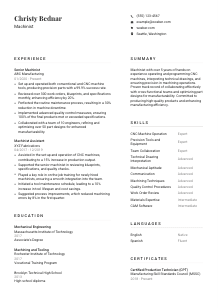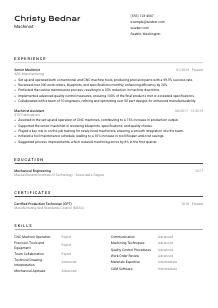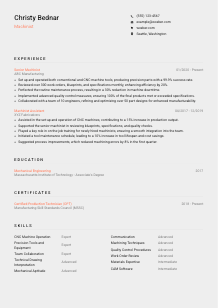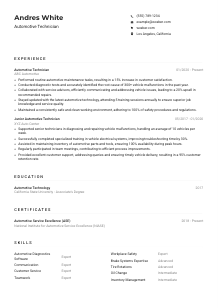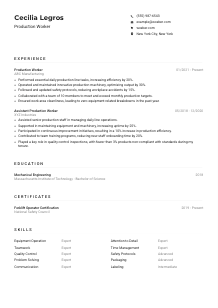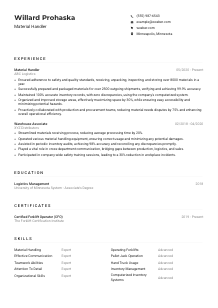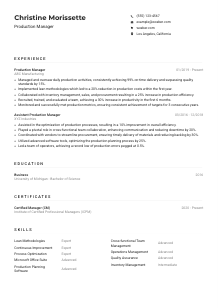Machinist CV Example
Shaping metal masterpieces, but your CV feels a bit rough around the edges? Explore this Machinist CV example, honed with Wozber free CV builder. Learn how to grind your engineering expertise into a perfectly profiled format, positioning you as the cutting edge candidate for machining careers!
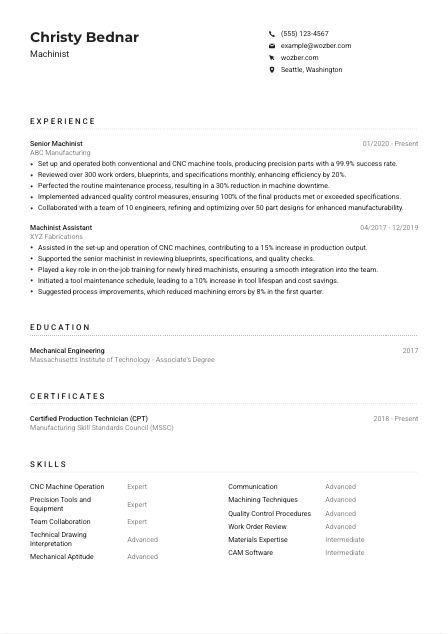
How to write a Machinist CV?
Step into the world of machining, where each detail counts and precision is your best friend. Your CV is the initial blueprint guiding potential employers through your career craftsmanship. This guide, powered by the insights of Wozber's free CV builder, is your comprehensive toolkit.
With focus on ATS-compliant CVs, ATS-friendly CV formats, and strategic ATS optimisation, we're here to navigate through the nuances of creating a CV that not only matches the machinist job description but sets you apart as the candidate of choice. Let's turn the lathe of your career aspirations into a well-designed path leading to your next machinist role.
Personal Details
Like the precise setup of a machining operation, the Personal Details section of your CV does more than list your contact information—it presents you as the ideal candidate right from the start. Tailored specifically for a machinist role, let's ensure this section is machined to perfection.
1. Cast Your Name in Bold
Think of your name as the headline of your professional story. Ensure it's prominently displayed in a clear, professional font that commands attention. This is where the journey of your CV begins, and clarity here sets the pace for what follows.
2. Position Your Target Role
Directly beneath your name, align yourself with the role you're applying for by inserting the title "Machinist." This instantly communicates to hiring managers that your skills and aspirations are in perfect sync with the role being offered.
3. Detail Your Contact Information
- Phone Number: Ensure this critical line of communication is accurate and clearly displayed. A simple check can prevent missed opportunities.
- Professional Email Address: Your email should reflect professionalism. A combination of your first and last name is always a safe bet.
4. Sharpen Your Location Details
In this example, stating "Seattle, Washington" not only meets one of the job description's requirements but also reduces any concerns regarding your ability to promptly start the role without relocation delays.
5. Skip The Excess Material
Personal details like age, gender, or marital status aren't necessary and could lead to unintended bias. Keep the focus on your professional qualifications and readiness for the role.
Takeaway
The craftsmanship of your Personal Details section should mirror the precision and clarity you bring to your machinist work. It's your initial handshake with the hiring manager—make it count. Personalize, precise, and perfect—it's your key to making a memorable first impression.





Experience
Your Experience section is where your career's craftsmanship truly comes to life. Here, precision in detailing your past roles and accomplishments demonstrates your suitability for the machinist position. Let's lathe this section to showcase your expertise and achievements in a way that resonates with hiring managers.
- Set up and operated both conventional and CNC machine tools, producing precision parts with a 99.9% success rate.
- Reviewed over 300 work orders, blueprints, and specifications monthly, enhancing efficiency by 20%.
- Perfected the routine maintenance process, resulting in a 30% reduction in machine downtime.
- Implemented advanced quality control measures, ensuring 100% of the final products met or exceeded specifications.
- Collaborated with a team of 10 engineers, refining and otimizing over 50 part designs for enhanced manufacturability.
- Assisted in the set‑up and operation of CNC machines, contributing to a 15% increase in production output.
- Supported the senior machinist in reviewing blueprints, specifications, and quality checks.
- Played a key role in on‑the‑job training for newly hired machinists, ensuring a smooth integration into the team.
- Initiated a tool maintenance schedule, leading to a 10% increase in tool lifespan and cost savings.
- Suggested process improvements, which reduced machining errors by 8% in the first quarter.
1. Analyze the Job Specifications
Dissect the job post for specific machinist-related skills and experiences. Aligning your past roles with these points is like ensuring your machined parts match the technical specifications perfectly.
2. Layout Your Professional Path
List your roles in reverse chronological order, highlighting your progression in the machining field. This format is akin to reading a blueprint—it should lead the reader through your professional growth seamlessly.
3. Showcase Your Precision Work
For each role, bullet points should highlight responsibilities and achievements that align with the machinist role you're targeting. Quantifiable achievements, such as improving production efficiency by a specific percentage, speak volumes of your capability.
4. Measure Your Impact
Whenever possible, quantify your contributions. Numbers offer tangible proof of your impact, such as the reduction in machine downtime or efficiency improvements in machining processes.
5. Focus on Relevance
Remember, it's not about the quantity of experiences, but their quality and relevance. Prioritize the details that most strongly align with the machinist job description, ensuring every point serves a purpose in showcasing your skills and achievements.
Takeaway
Think of your experience section as a portfolio of your finest work. Each entry should reflect the precision, skill, and dedication you bring to the machining field. Tailor this section with care, and let it stand as proof of your suitability and excellence for the machinist role.
Education
In the world of machining, your educational background provides the foundational knowledge that supports your hands-on skills. This section of your CV should be machined to align with the role's requirements, demonstrating your preparedness from the ground up.
1. Align With Role Requirements
Identify the educational credentials the job description prioritizes. In our example, a high school diploma and relevant vocational training highlight a base foundation tailored to the machinist role.
2. Structure for Easy Reading
Organize your educational history clearly, leading with the most recent or relevant qualifications. Think of this as setting your tools in order before beginning a precision job—organisation is key.
3. Detail Relevant Qualifications
For each educational entry, align titles and fields of study with those sought by employers for machinist roles. This customization shows a direct correlation between your education and the job requirements.
4. Highlight Pertinent Courses or Projects
If your coursework or projects directly relate to machining or have equipped you with skills pertinent to the role, include these details. This can be particularly effective for recent graduates or those transitioning from related fields.
5. Showcase Continuous Learning
If applicable, mention ongoing education or certifications that reinforce your commitment to staying abreast of industry advancements. The machining industry values precision and up-to-date knowledge—show you have both.
Takeaway
Your Education section is not just a record of schooling—it's proof of your journey towards becoming a skilled machinist. It establishes the groundwork for your practical skills and highlights your commitment to mastering your craft. Craft this section with as much care as your finest machined part.
Certificates
As a machinist, certifications can set you apart, showcasing specialized skills or knowledge that enhance your craft. Such endorsements are like the high-grade finish on a well-machined part—they make you stand out. Let's highlight your certificates to catch the eye of any prospective employer.
1. Identify Key Certifications From the Job Post
Even if the job description doesn't explicitly require specific certifications, consider the ones most valued in the machining world. Our example CV showcases the Certified Production Technician (CPT) to align with industry standards.
2. Select Certificates With Direct Relevance
Your choice of certificates to display should directly reflect your proficiency in areas critical to the machinist role. This targeted approach ensures that your CV speaks directly to the needs and standards of the industry.
3. Date Your Achievements
When listing certificates, include the date of achievement when relevant. This provides context and shows continuous professional development, a highly valued trait in the machining industry.
4. Commit to Ongoing Learning
The machining field is ever-evolving, with new technologies and methodologies emerging. Displaying a commitment to ongoing learning through recent or advanced certifications demonstrates your dedication to excellence and innovation in your craft.
Takeaway
Much like the precision machined components you produce, the Certificates section of your CV serves as a testament to your skill, dedication, and attention to detail. Choose certifications that reflect your mastery and ambition, and let them serve as proof of your commitment to being at the forefront of your field.
Skills
Your skills section is the toolbox of your CV, each skill a meticulously chosen tool tailored for the job at hand. For a machinist, this means a balanced mix of technical prowess and the softer skills that enable effective teamwork and communication. Let's optimise this section to highlight your well-crafted skillset.
1. Decode the Job Specifications
Extract both hard and soft skills from the job description. This machinist role calls for a blend of technical skills like "CNC Machine Operation" and soft skills such as "Effective Communication." Your CV should reflect this mixture to show you're well-rounded.
2. Prioritize Matched Skills
List skills that align with the job requirements first. For instance, mastery in "Precision Tools and Equipment" and an "Expert" level in "CNC Machine Operation" directly speak to the heart of what it means to be a successful machinist.
3. Organize for Impact
Keep your skills list focused and organized. Overloading this section can dilute its impact. Think like you're organizing your toolbox—keep it neat, accessible, and relevant to the job at hand.
Takeaway
The Skills section of your CV should reflect the precision, commitment, and adaptability that you bring to your machinist role. It's your opportunity to impress upon the hiring manager that you possess not just the technical know-how, but also the soft skills that make you a valuable team player. Craft this section with the care and precision that you would bring to any machining task.
Languages
In the diverse environment of machining, the ability to communicate in multiple languages can be a significant asset. This section offers the chance to showcase your linguistic skills and cultural adaptability—a bonus in any workplace. Let's articulate this part of your CV with precision, ensuring it aligns with the machinist role you're targeting.
1. Review Role-Specific Requirements
The job listing specifies "Strong English proficiency" as a necessity. Ensure this is prominently listed, showcasing your capability to meet the core requirements.
2. Elevate Key Languages
If you are fluent in languages beyond English, list them in order of proficiency. This additional skillset can set you apart, suggesting a broader range of communication and collaboration abilities.
3. Catalogue Your Linguistic Proficiency
Be honest and specific about your level of proficiency in each language. Employ clear terms such as "Native," "Fluent," "Intermediate," or "Basic" to provide a precise understanding of your capabilities.
4. Understand the Role Context
Consider the broader context of the role. If the machinist position involves working with international teams or suppliers, highlighting your multilingual skills can be particularly advantageous.
5. Reflect on the Global Work Environment
In today's interconnected world, the ability to communicate across cultural boundaries is invaluable. Even basic proficiency in additional languages can be a strong asset, underscoring your capability to thrive in a global work environment.
Takeaway
Language skills can open doors and create bridges in your career. Whether it's ensuring crystal-clear communication or demonstrating your adaptability to a global team, these skills are an invaluable part of your professional toolkit. Articulate your linguistic capabilities with the same precision you apply to your machining work, and watch as new opportunities unfold.
Summary
Your summary is like the finely tuned part that emerges from a well-set lathe—a concise yet comprehensive showcase of your capabilities as a machinist. This section should anchor your CV, drawing the hiring manager in with a compelling narrative of your professional journey and expertise.
1. Grasp the Job's Core
Understand the essence of what the role entails. For a machinist, it's about precision, technical skill, and effective collaboration. Your summary should echo these requirements, positioning you as the ideal candidate from the get-go.
2. Introduction with Impact
Begin with a punchy opening line that encapsulates your professional identity and experience. For example, "Machinist with over 5 years of hands-on experience" instantly paints a picture of a seasoned professional.
3. Highlight Your Expertise
Point out your specific skills and achievements that align with the job description. Mention your proficiency in reading technical drawings, CNC machine operation, and collaboration with engineers to optimise designs—showcasing the breadth and depth of your expertise.
4. Precision in Summary
Keep your summary concise and to the point, distilling your professional essence into a few powerful lines. This is your elevator pitch—the moment to make your mark and invite the hiring manager to read on.
Takeaway
Your summary is the facing operation to your CV, creating a smooth, inviting entry point that encourages deeper exploration. It's where you align your narrative with the job's requirements, signaling that you are not just a candidate, but the right candidate. Sharpen this section with the care and precision you would apply to any piece on the lathe, and prepare to advance into your next role with confidence.
Launching Your Machinist Journey
Congratulations, you have meticulously crafted a CV that speaks volumes of your expertise and readiness for the Machinist role. With Wozber's free CV builder at your fingertips, including ATS-friendly CV templates and an ATS CV scanner, you're fully equipped to tailor your CV to meet the exact demands of your dream job. Remember, your CV is a living document, a reflection of your professional journey. Keep honing it with every new skill acquired, every project completed, and every milestone achieved.
The world of machining awaits your unique talents and expertise. Sharpen your tools, set your sights on the horizon, and take the next step in your career with confidence.

- High school diploma or equivalent;
- completion of a relevant vocational training program or apprenticeship highly preferred.
- Minimum of 3 years of experience operating and programming CNC machines.
- Proficiency in reading and interpreting technical drawings to ensure precision and accuracy in machining operations.
- Strong mechanical aptitude and knowledge of various types of materials, tools, and machining techniques.
- Effective communication skills, both written and verbal, to collaborate with teams and provide detailed reports.
- Strong English proficiency is a fundamental skill.
- Must be located in or willing to relocate to Seattle, Washington.
- Set up and operate a variety of conventional and CNC machine tools to produce precision parts.
- Review work orders, blueprints, and specifications to determine sequence of operations, dimensions, and tolerances.
- Perform routine maintenance on machines, ensuring they are in optimal condition for production.
- Incorporate quality control procedures to ensure final products meet specifications.
- Collaborate with engineers and designers to refine and optimize part designs for manufacturability.





